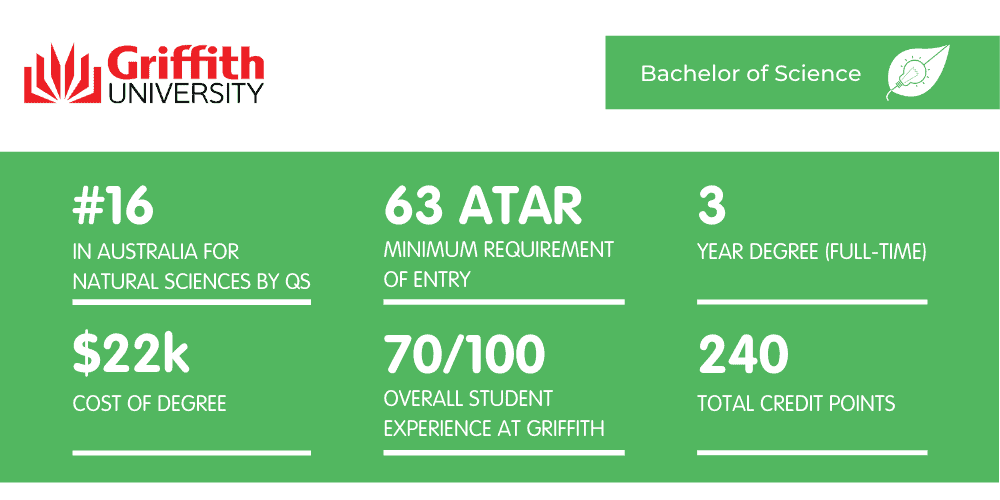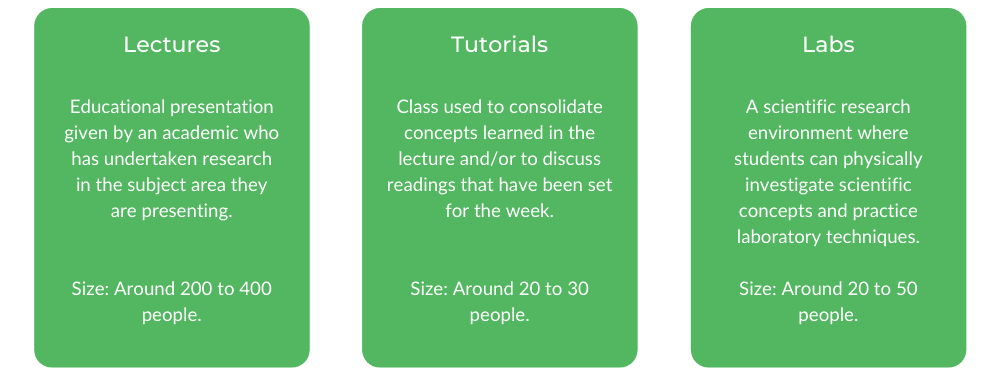Are you a bit of a science buff and interested in knowing why things work the way they do? If you like the idea of a job that’s hands-on, making important discoveries and rocking a cool looking lab coat, don’t go anywhere, because a Bachelor of Science at Griffith University could be just the thing for you!
And you’re in luck, because we’re about to unpack everything you need to know about it.
Let’s get right into it!
What is a Bachelor of Science at Griffith University?
Core Units and Majors
How to Get into a Bachelor of Science at Griffith University
What’s the Teaching Format?
What’s the Faculty and Culture Like?
What is a Bachelor of Science at Griffith university?
A Bachelor of Science at Griffith University is a science-focussed degree which exposes students to a variety of different scientific fields before allowing them to specialise in an area of their choosing through the selection of a major.
Griffith offers a whole heap of majors, making it the ideal degree for anyone who knows they have a keen interest in all things science, but are yet to know what field they want to specialise in.
Honours
An Honours pathway is available for this degree at the end of the third year. Given you have met the entry criteria — maintained a 5.0 GPA over second and third year — you can complete this additional year of study where you will undertake a major research project.
This pathway is recommended for those students wishing to pursue a career in research or work towards a PhD qualification.
Career Paths
Graduates of Griffith’s Bachelor of Science have a wide variety of career paths available to them. The types of jobs open to them are ultimately dependent on their choice of major, however some of these careers include:
- Microbiologist
- Pharmaceutical scientist
- Biochemist
- Statistician
- Environmental scientist
- Marine biologist
Further study could also lead to careers in science journalism or science teaching.
Learn more about other careers you can pursue with a Bachelor of Science here!
Core Units and Majors
What are the Core Units?
In first year, students studying a Bachelor of Science at Griffith complete a broad range of different science-related courses.
These include subjects such as Human Biology, Chemistry I, and Introduction of Environmental Sustainability. The idea is that students can pick from a variety of subjects to get a better idea of what major they would want to pursue.
In second year, students start completing subjects in direct relation to their major. Alongside these subjects, they also have the chance to choose from a large pool of electives or select targeted subjects to complete a second major.
Third year is similar to second year, with students completing their major subjects. It is also recommended in third year that students complete a capstone unit or an industry placement unit — classes which give students the opportunity to complete professional research projects, mimicking what can be expected in the industry.
What are the Majors?
Griffith offers a myriad of majors for students to choose. They include:
- Applied Mathematics
- Biochemistry and Molecular Biology
- Chemistry
- Clinical Sciences
- Data Science
- Geography
- Marine Biology
- Microbiology
- Physics
- Wildlife Biology
You can also choose to do a double major, using your choice of electives to pursue yet another specific area of interest.
What is a Wildlife Biology major like?
Wildlife Biology is one of the majors offered at Griffith University. It involves a lot of biology, but also delves into topics such as Earth Systems, Genetics and Evolutionary Biology and Botany.
It is a great major to choose for anyone interested in going into wildlife conservation, as well as research and academia.
Are there any placements?
The Bachelor of Science at Griffith University requires students to complete a capstone unit or a Work Integrated Learning Placement throughout their degree.
Both are designed to emulate the experience of working in a professional environment, preparing students for life after university. If they select the capstone unit, students can choose to do a science or environmental one.
How to Get into a Bachelor of Science at Griffith University
The ATAR cut-off for guaranteed entry into this degree is 63. In addition to this ATAR score, students must also meet certain prerequisites to be eligible for enrolment into this course.
For students using the QTAC application pathway, it is required that they complete any General or Applied English, as well as General Mathematics or Mathematical Methods. It is also recommended that they take either Biology, Chemistry or Physics, however this isn’t a necessary requirement for enrolment.
Students using the UAC pathway must complete any two units of English in Years 11 and 12. Again, it is highly recommended they also complete a science subject.
Alternate Pathways
Griffith’s Guaranteed Admission Scheme offers school leavers and mature-aged students the opportunity to gain guaranteed admission to the course of their choice for an ATAR of 80+ or the completion of a relevant VET qualification.
A really important thing to note about Griffith’s enrolment process for this course is their flexibility. This degree allows students to enrol in Trimester 1, 2 and 3 — meaning that you have the ability to begin this course when it best suits you! How good is that?
Scholarships
Griffith offers many scholarships. Recipients are able to earn them based on academic merit, financial hardship or contributions to the community. Some of the scholarships available with direct relation to students studying Science include:
- Johnson & Johnson WiSTEM2D Scholarship
- Lamington Natural History Association Bursary
- McIlwain Family Scholarship
What’s the Teaching Format?
Griffith University organises their teaching year by trimesters. This means that the year is separated into three study blocks of 12 weeks.
Scheduling the year using trimesters gives students more flexibility in regards to how they organise their studies.
For example, students can opt to complete 80 credit points in the first two trimesters and then take the third trimester off — giving them a much bigger summer break. Alternatively, students can spread out their 80 credit points across the three trimesters, enduring smaller study loads each trimester.
Full-time students can expect to attend 15-25 hours of scheduled classes per week throughout the trimester. On top of this, it is recommended that students complete 10-15 hours of additional self-directed study.
Class Structure
Lectures
Lectures are the main source through which content is delivered to students. In large, presentation-style formats, lecturers run through the week’s content with the cohort. They are typically hosted in an auditorium and hold a couple hundred students — anywhere between 200 to 400.
Tutorials
Tutorials are smaller groups of students — usually about 20 to 30 — in a classroom environment where tutors further explain the content covered in lectures. In this setting students perform various activities to help further their understanding of important concepts and theories.
Labs
In labs students undergo practical activities to learn how to apply the theoretical component of lectures and tutorials to real-life scientific situations. These are less frequent than other teaching formats and can occur once a week, once a fortnight or even a few times a trimester. Labs and field-based labs usually consist of 20 to 50 students.
Assessments
The assessments for each class in a Bachelor of Science are all very different. They range from heavily-weighted exams to lab reports, policy briefs to mock assignments designed to mimic what you might encounter in the industry.
While they can be challenging, students at Griffith have a great support network and are always able to reach out to their faculty, peers or available mentoring programs for assistance.
Skills You Refine and Learn
The majority of the skills taught in this degree are all highly practical, with a strong focus being placed on preparing students for their future employment in the industry.
First and second year classes teach students a lot of lab-based skills, such as how to use lab equipment and necessary safety procedures for working in that environment.
Students also learn how to communicate effectively through the numerous assessments involving report writing. Through this process students understand the importance of knowing how to accurately explain their scientific findings.
There is a lot of group work involved in this course and so a major skill that students learn is how to effectively work in teams. In addition to this, the heavy workload of this course means that students quickly learn how to properly manage their time.
What’s the Faculty and Culture Like?
The faculty for Griffith’s Bachelor of Science are said to be super supportive and very approachable. They are always up for a chat and always doing their best to be accommodating to different student’s circumstances.
“They love seeing people passionate and they are so happy to stay after class and talk to you about different passions you have or career paths you want to take.” — Rachel Jackson
On top of this, the locations of the Gold Coast and Nathan campuses are hard to beat. At the Gold Coast campus you are super close to the beach, while at Nathan there are heaps of cool bush walks and interesting wildlife surrounding the grounds.
The culture at Griffith is one of inclusivity. It is a place which readily welcomes people from all different kinds of backgrounds. They do this by offering heaps of diverse societies and decorating their campuses with murals celebrating inclusivity.
Relevant Societies
As mentioned before, Griffith offers a wide range of clubs and societies for their students to get involved in.
For a Bachelor of Science in particular, students can partake in clubs such as Environmental Griffith Students Gold Coast or Griffith Women in STEM and Education. Groups such as these offer students the chance to meet people with similar interests, network with people in the industry and continue fostering their love for all things science.
Support Programs
One of the main mentoring opportunities available at Griffith University is the Peer Assisted Study Sessions program. In this program, students struggling with certain classes can participate in group learning sessions run by older students who have previously achieved excellent results in that class.
“As group leaders we don’t really teach new content or answer questions for them, but help the students bounce off each other and facilitate study by creating activities….It is an amazing program, I really believe in it.” — Rachel Jackson
Unsure about this degree? Check out all the options for tertiary education that is available to you beyond High School here!
Jessica Arentz is a Content Writer at Art of Smart and an undergraduate student at the University of Sydney where she studies a Bachelor of Arts/Advanced Studies (Media and Communications) (Marketing). She currently volunteers at 2SER community radio station as a producer and newsroom reader. When not writing, you can find Jess searching the web for cheap flights or spending her days with her head buried deep in a book.






